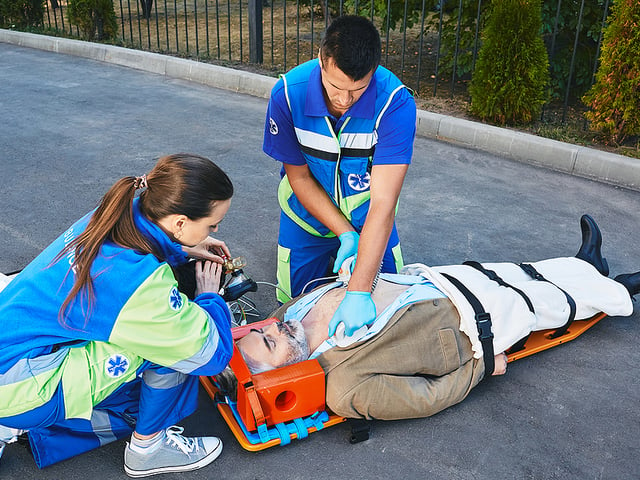
EMT vs Paramedic: Exploring the Differences
In these troubling economic times, many of us just want security. Careers in healthcare are considered to be some of the most recession-proof options on the market, and there’s no job like emergency medical technology. It has one of the lowest barriers to entry for any medical profession, and jobs are widely available.
If you’re looking into a career in healthcare, you may be wondering which is better, becoming an EMT or a paramedic? Well, that’s up to you, but we can still discuss the facts! Let’s settle the score on EMTs versus paramedics: what’s the difference, and which career path is right for you?
What Is an EMT?
An emergency medical technician (EMT) is a first responder with basic emergency medical training. EMT-Bs are the basic level of training that most EMTs will start out with, followed by EMT intermediate and EMT advanced.
EMTs are trained to use basic emergency medical technology, perform CPR and first aid, and make quick decisions for the sake of emergency patients. They will likely be trained and qualified for:
-
Patient care and transportation
-
Responding to drug overdoses
-
Perform CPR or use an AED machine
-
Using basic life support (BLS) technology
-
Provide first aid to a variety of patients
-
Administer medications (often limited or under supervision)
While most of us think of EMTs as the people who ride around in ambulances, they can work in many different capacities. Most EMTs (of all levels) typically work under the direction of a private ambulance company, hospital, or fire department. An EMT certification can also open the door for plenty of other jobs in hospitals, patient care facilities, doctor’s offices, and more!
Because an EMTs job can vary widely, it may not look remotely similar to another EMT job in the same town. However, their scope is still fairly limited compared to their more advanced counterpart, the paramedic.
What Is a Paramedic?
Paramedics are also emergency responders, and they are essentially advanced EMTs. Paramedic training builds upon what’s learned in an EMT course, and certified paramedics will have more training on:
-
Medication administration
-
Trauma care
-
Anatomy & physiology
-
Cardiology
-
Various medical procedures
Paramedics are also more qualified to handle certain situations that may arise during an emergency response. For example, they may be trained in more specific procedures such as emergency childbirth.
EMTs will typically have to operate under the direction or supervision of paramedics on their team. EMTs are limited in what they can do on their own, whereas paramedics are able to provide far more comprehensive care during emergencies.
While neither EMTs or paramedics are required to have a degree, a lot of paramedics have associate degrees. You will only need a certification for licensure, but certain jobs will require a diploma of some kind. Either way, the pay is rather high for such few educational requirements!
Currently, the average paramedic salary in the US is over $46,000 per year, with the typical range falling between $41,000 and $52,000. However, salaries can vary widely depending on your location, job, experience, and education levels. For example, a paramedic with a recent certification in a private ambulance company may not earn as much as a tenth-year firefighter with an associate degree in paramedic technology.
EMT vs Paramedic: What Is the Difference?
The main distinction between an EMT and a paramedic is the amount of training they undergo before certification. The EMT course will only require 170 hours of training, whereas the paramedic will need between 1,200 and 1,800 hours of training, up to ten times as many hours. It’s very common for paramedics to start out as EMTs and enroll in a course while working as emergency responders, but that isn’t always the case.
If you want to become a paramedic, it’s likely that the first course in your curriculum will be an EMT course. Therefore, all paramedics are EMTs, but not all EMTs are paramedics.
Because of their additional training, paramedics will typically earn a higher salary than their EMT counterparts. As we mentioned, paramedic salaries average over $46,000, with top earners ranging near 6-figures. Conversely, most basic EMTs will earn around $32,000 a year, with salaries often starting at between $14 and $16 per hour.
In a nutshell, both EMTs and paramedics are qualified to work in an emergency response setting. However, paramedics have more freedom to operate in crisis situations, and they will typically make more medical decisions involving critical patient care. In general, paramedics have more training, more experience on average, and higher pay than their EMT counterparts.
How to Become an EMT
To be eligible to become an EMT, you must be at least 18 years of age and have the legal right to work in the United States. You will also need to be free of any disabilities or impairments that may affect your judgment or ability to carry out the job.
If you meet these requirements, then you will need to take an EMT course, which usually lasts around 6 to 12 weeks. From there, you will need to prepare for the EMT exam and pass it to become a certified EMT-B. Even if you know you would like to become an immediate or advanced level EMT, you will still need to pass the EMT basic course first.
You can take these courses at your local community college, at a private institution, through a hybrid online course, or through your future employer. After that, you will need to maintain your certification over time, with recertification required every two years. During that period, you may be required to complete a certain number of continuing education units, or CEUs.
Finding EMT Jobs
EMTs are always in high demand. Once you are certified, you can apply for jobs with traditional ambulance companies, fire departments, or anywhere else you’d like. Hospitals, urgent care locations, and other care facilities are always looking for certified EMTs for various jobs, and some programs may offer assistance with finding work. There are plenty of other career paths to choose from once certified.
However, if you want to stand out from the competition, consider applying to entry-level medical jobs or volunteering in a medical facility prior to enrolling in your EMT course. This could help you get your foot in the door early to a potential employer!
Alternatively, having an additional certification or starting your path toward becoming an intermediate EMT or paramedic could help you stand out and find work before some of your classmates. If employers know you’re studying to become a paramedic, they may jump at the opportunity to hire you.
Otherwise, study hard and prepare for the EMT exam. A certification, great test scores, and some in-school networking will go a long way to help you find the job of your dreams!
How to Become a Paramedic
Again, paramedics require at least 1,200 hours of training prior to certification, but that’s not all. You’ll need to meet the same eligibility guidelines as an EMT, and different jobs may have additional requirements. From there, you’ll need to find the right program.
Paramedics will need to attend an accredited program through a community college or private institution. Because of the hands-on nature of the job, there aren’t many accredited, fully online programs. However, if you need to work around a busy schedule, hybrid or blended courses from reputable institutions are available in most areas. Be sure to do your homework before committing to any program that sounds too good to be true.
Even if you know you want to become a paramedic, we’d recommend obtaining your EMT licensure first, especially if you aren’t getting a degree. Without a degree, paramedic jobs can be competitive, so having experience under your belt and a foot in the door with a job can help you get ahead. In most cases, paramedics will be required to have at least 6 months of work experience as an EMT.
Once you complete your educational and on-the-job requirements, you’ll need to study for the exam. We’d recommend brushing up on the basics, as they can be easy to forget. Feel free to use our EMT study guides, practice tests, and flashcards for a refresher!
From there, you can apply for jobs that require or prefer a paramedic job and choose the one that’s the right fit for your career goals!
Start Your New Career Today
Now that you know the difference between an EMT and a paramedic, you can make an informed decision as to which career path is right for you. Paramedics will earn a higher salary and have more freedom in their careers, but becoming an EMT first can help you earn good money right away and lay the groundwork for a rewarding career in the medical field. No matter what option you choose, we’d love to help you get there — create a free account to begin studying for your new career today!
Keep Reading

Emergency Medical Technician Test Blog
How Many Questions are on the NREMT?
The National Registry of Emergency Medical Technicians (NREMT) exam is …

Emergency Medical Technician Test Blog
How Hard is the EMT Test?
EMTs (Emergency Medical Technicians) are required to have strong medica…

Emergency Medical Technician Test Blog
What Is a Passing Score on the NREMT Exam?
The job outlook for EMTs and paramedics is strong. The Bureau of Labor …